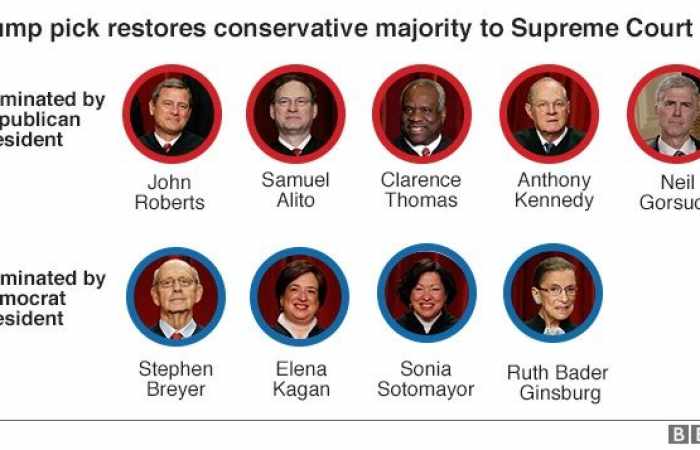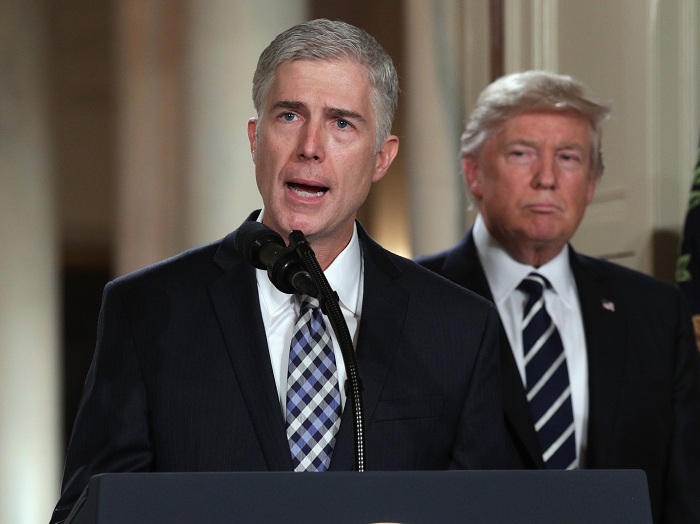Other cases which deadlocked between the eight current justices may be reheard now that there is a ninth justice in place to break the tie on America's highest court.
Here are some of the key cases he may have a hand in deciding in the coming weeks and months.
Church and state
Trinity Lutheran Church of Columbia v Comer
One of the first cases Justice Gorsuch will hear, with oral arguments due to begin next week, concerns separation of church and state.
A school run by Trinity Lutheran Church in Missouri sought to take part in a state programme that resurfaces playgrounds with rubber from recycled tires.
But the Missouri Department of Natural Resources denied the request, arguing that the state constitution prohibited funding of religious organisations.
Representing the church, the Alliance Defending Freedom said the denial infringed the church's First Amendment rights.
The case was accepted by the court in January last year but delayed a hearing for 15 months.
Religious freedoms
Masterpiece Cakeshop v Colorado Civil Rights Commission
The Supreme Court is due to decide this week whether to accept the case of a baker in Colorado who refused to make a wedding cake for a gay couple, on religious grounds.
The lower courts found that the owners of Masterpiece Cakeshop had violated Colorado's Anti-Discrimination Act (CADA), and the decision was upheld by the Colorado Court of Appeals.
The case has been under consideration for acceptance by the Supreme Court since January, suggesting that Judge Gorsuch could tip the balance either way.
He has previously found in favour of religious freedoms in the workplace, including in two of his most well-known cases.
In Burwell v Hobby Lobby and Little Sisters of the Poor v Burwell, Judge Gorsuch ruled that a requirement for employers to cover contraception under their health insurance plans infringed their religious freedoms.
Gun rights
Peruta v San Diego
This takes up a lower court ruling that said the second amendment alone did not grant California gun owners the right to carry a concealed weapon in public places. The ruling granted counties the right to apply additional tests before granting a permit, including whether the applicant showed "good cause" to require it.
The argument essentially boils down to whether the existing right to gun ownership for self defence at home extends to carrying a concealed weapon in public places.
"Any prohibition or restriction a state may choose to impose on concealed carry - including a requirement of 'good cause,' however defined - is necessarily allowed by the [Second] Amendment," said the lower court ruling.
The ruling led to variation across counties, with some sheriff's offices denying nearly all concealed carry applications. The restrictions are being challenged by a group of Second Amendment campaigners.

Travel ban
President Trump's controversial executive order banning travel from six Muslim-majority countries is probably heading to the Supreme Court later this year.
Justice Gorsuch repeatedly declined to comment on the issue during his confirmation hearings, but a Supreme Court case would provide a public test of his independence from Mr Trump, who nominated him for the court.
The order is due to go before the Fourth Circuit and Ninth Circuit court in May.
Another immigration issue which could make its way to the court at some point is Mr Trump's attempt to strip federal funding from so-called "sanctuary cities" - cities that refuse to comply with federal orders to detain immigrants.
Mexico shooting
Hernandez v Mesa
This is the case of a 15-year-old unarmed Mexican boy who was on the Mexican side of the border when he was shot dead in 2010 by a US border patrol agent, in disputed circumstances. Sergio Hernandez's family want to sue the agent for infringing the boy's constitutional rights.
The Supreme Court has already heard oral arguments in the case but the justices did not reach any conclusion. That opens the way for the case to be reheard with Justice Gorsuch on the bench.
Voting rights
North Carolina v North Carolina NAACP
In July, judges on the 4th Circuit Court of Appeals ruled against a North Carolina voting overhaul that they said targeted African Americans "with almost surgical precision".
The case went to the Supreme Court in August but split the justices 4/4 over whether to prevent the overhaul coming into effect before November's general election.
With the case due to go before the court again, Judge Gorsuch could swing the result either way.
Joel Gunter is a reporter of BBC news.
More about: #Gorsuch
















































